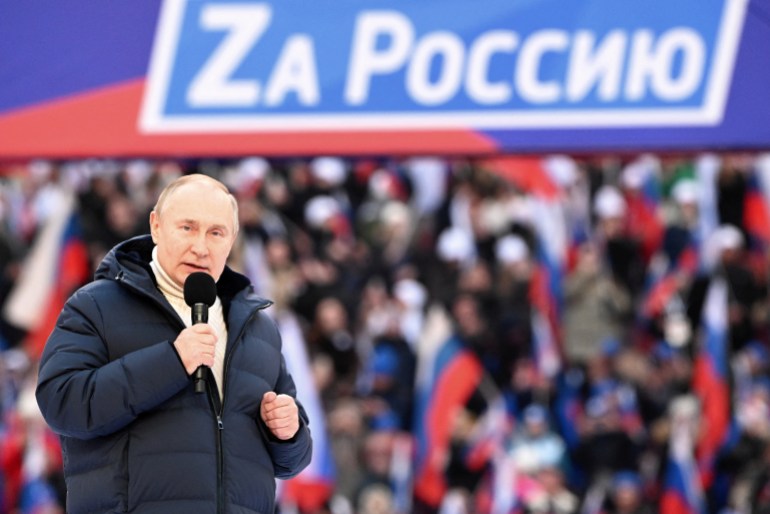Ukraine war: What would a ‘rupture’ in US-Russia relations mean?
Washington, DC – US President Joe Biden’s recent comment that Russian President Vladimir Putin “cannot remain in power” is just the latest example of how far relations between the United States and Russia have fallen amid Moscow’s continued invasion of Ukraine.
While White House officials and Secretary of State Antony Blinken quickly moved to clarify that the US is not advocating for “regime change” in Russia, Biden also recently called Putin a “butcher” and a “war criminal”, prompting the Kremlin to warn that bilateral ties were nearing “rupture”.
Should that happen, analysts say the ramifications could ripple well beyond any potential ceasefire or peace negotiations in Ukraine to other areas of US-Russian diplomacy, including most notably to Iran nuclear talks.
Daryl Kimball, executive director of the Arms Control Association, a Washington-based advocacy group, said whether Moscow will go along with an agreement – given what it now sees as a proxy war with Washington in Ukraine – is uncertain.
“We are in a situation now where relations are at rock bottom,” Kimball told Al Jazeera. “Russia could try to block an understanding that brings the US and Iran back into compliance.”
The original 2015 Iran deal – formally known as the Joint Comprehensive Plan of Action (JCPOA) – was agreed to between Iran and the so-called P5+1 countries: the US, United Kingdom, France, Russia and China, plus Germany.
Former US President Donald Trump withdrew from the deal in 2018 to pursue a “maximum pressure” strategy against Iran, which in turn ramped up its nuclear programme beyond the limits set by the pact.
Multiple rounds of US-Iran negotiations in Vienna aimed at reviving the deal have been indirect, relying on go-betweens. If a new agreement must be validated by the United Nations Security Council, Russia’s acquiescence may be required – and continuing delays could prove fatal to a deal, Kimball said.
“The talks are at a critical stage,” he said. “The longer this drags out, the more likely it is that some other external event is going to blow up the possibility of compliance with the JCPOA.”
‘Everything depends on Ukraine’
Meanwhile, Russia is facing a series of biting sanctions imposed by the US and its European allies over the ongoing invasion of Ukraine, now into its second month.
The conflict has pushed more than 3.8 million people to flee the country and led to over 1,100 confirmed civilian deaths, according to the UN – though the real death toll is believed to be much higher.
Face-to-face talks between Ukrainian and Russian negotiators are set to resume in Turkey this week, while the Russian military appears to be focusing its attacks in Ukraine’s eastern provinces, potentially with a view towards creating a Korea-type situation that would see the country divided.
Oleg Ignatov, a senior analyst on Russia at the International Crisis Group, said US-Russian diplomatic relations will be largely “frozen” so long as the war in Ukraine continues.
“Everything depends on what happens in Ukraine,” Ignatov told Al Jazeera in a phone interview from Moscow. “Russia and the West will not recover their relationship if Russia occupies some parts of the Ukraine, even if Russia stops in the Donbas.”
He added: “I don’t see any evidence that Putin has changed his position on Ukraine. I don’t see any evidence we could have normalisation.”
Other issues
Experts say that means other areas of competition and cooperation between the world’s two largest nuclear powers could also be impacted, including work at the International Space Station, military deconfliction in and around Syria, and security in Nagorno-Karabakh, among other things.
“Everything is now in jeopardy, and nobody in the diplomatic corps of either country really knows how things will play out,” said Arne Kislenko, an associate professor of history at Ryerson University in Toronto, Canada.
Last week, Russia’s Foreign Ministry summoned US Ambassador to Russia John Sullivan to answer for comments Biden made to reporters at the White House calling Putin a “war criminal”.
“Such statements by the American president, which are not worthy of a high-ranking statesman, have put Russian-American relations on the verge of rupture,” the ministry said.
That warning did not stop Biden from going on the next day to call Putin a “pure thug” and a “murderous dictator”, however, or from calling for Putin to be barred from attending the Group of 20 (G20) meeting to be held in Indonesia in November.

For now, that does not appear likely, after China rejected Biden’s suggestion, and Russia said Putin still plans to attend, said Rohinton Medhora, president of the Centre for International Governance think-tank in Waterloo, Canada.
“I can see a situation in which diplomatic relations [between Washington and Moscow] are ended, but those kinds of multilateral discussions still continue and the Russian representative shows up,” Medhora told Al Jazeera.
But, Medhora said, “it’s hard to imagine Biden and the White House wanting to have any constructive dialogue with the Kremlin and Putin at this point, given what’s transpired.”



